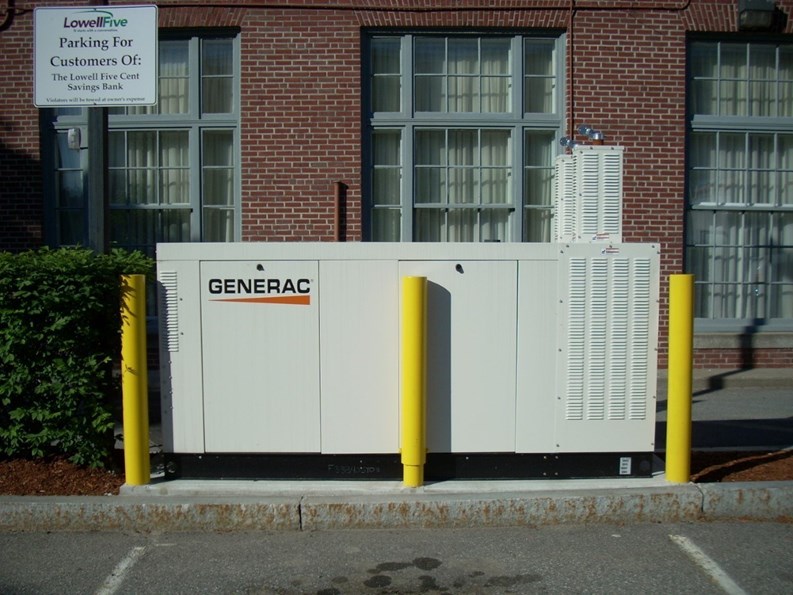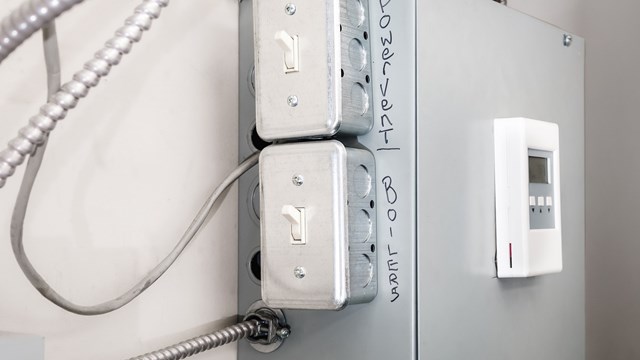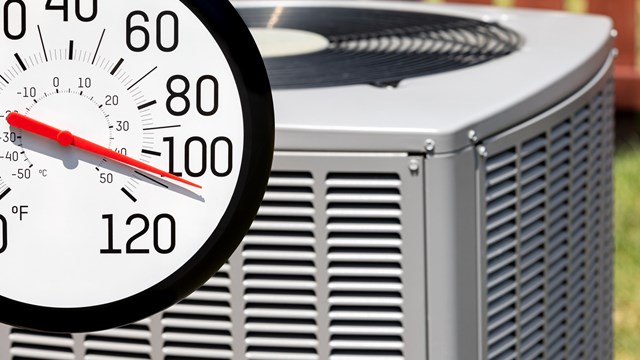Blizzards. Ice Storms. Hurricanes. New Englanders are used to being buffeted by Mother Nature. But increasingly, it seems, the impact of such storms has lingered long after the weather front blows through, with hundreds or thousands of residents left in the dark.
To add insult to injury, occurrences like the recent demise of a Boston electric substation have cut power to thousands of homes in the midst of a summer heat wave.
Beyond the inconvenience—the loss of modern-day necessities like television and air-conditioning—power outages can wreak havoc on condominium residents. It’s not unusual, property managers say, for suburban associations to rely on electricity for such basics as fresh water and toilets that flush. And residents of high- or even mid-rise buildings may require elevators for access to their homes.
The folks at One Charles Condominium in downtown Boston were power-less for about 24 hours in June after a transformer in a Copley Square substation blew out. And at that, they were lucky—some nearby residents were without electricity for several days.
But although inconvenienced, the condominium residents weren’t trapped in their 17-story building, thanks to a backup generator that knew when it was time to go to work. The diesel-powered, tractor-trailer-sized generator on the building’s roof “carries the load of the elevators, life safety equipment, minimal heat, and two water pumps,” says Brian Buhler, general manager for the luxury condominium. In a winter storm situation, he says, residents could also open their doors and benefit from the building’s “core heat” in the hallways and common areas.
In an age of electricity dependency, those downtown residents are more fortunate than most. While generators are often required by code in high-rise buildings serviced by elevators—to ensure that residents can be evacuated safely—few condominiums have backup power for any of life’s more mundane services, like heat, refrigeration, or even lighting.
There are, of course, always exceptions, and the Meeting House at Stow condominium in Stow, Massachusetts, is among them. That four-story property encompassing 64 units “has a generator that will run the basement and first two floors—the first floor common area, first floor units and a community room,” says Michael G. Monahan, manager, at The Dartmouth Group, a Boston management company. The 55+ condominium, he says, has a huge community room where residents could gather in the case of an outage, thanks to that generator.
“Generators can be expensive, so they’re ideally suited to a high-rise building, because usually you’ll have one panel, one source of electricity for the entire building,” says Stephen DiNocco, principal of Affinity Realty & Property Management in Boston. They may also be required for safety reasons. In Massachusetts, for example, the state building code mandates generators for buildings over 70 feet tall to operate elevators in an emergency. They’re not often seen in suburban communities, spread out in multiple buildings over a large area.
And because they’re large, expensive, and can be complicated to install, powerful generators haven’t picked up much steam in New England condominium settings despite frequent news reports of power outages in the past few years.
The power units are generally installed by the developer during construction if needed for purposes like elevators or other safety issues. “You really only see them in larger buildings with those special needs,” says property manager David J. Levy of Sterling Services in Holliston, Massachusetts. “I’ve never heard of a building adding a backup generator,” Levy says, due to the cost and technical intricacies involved. It’s not unusual for generators here to still be in use two decades after being installed, since they see so little actual running time. Monahan says he worked on the replacement of one generator that had been in service for 25 years. “It didn’t have a lot of hours on it, but it was 25 years old, it needed new parts, and if you fixed it, you’d still have a 25-year-old generator. It was more cost-effective to replace it than to piecemeal it,” he says.
Although adding a generator can be out of reach for most communities, Buhler says that in some cases, existing generators have excess capacity, and their use can be expanded—though at a price. His downtown property mentioned earlier, for example, has more capacity than it’s using, and the association is looking at adding more components including the garage door and management office to the load. “We have to lift [the overhead door] by a pulley system, so we want to put it on the generator, so it will function in a crisis,” he says.
Pressing Needs
For many suburban communities, the special needs powered by backup generators are elements that are “out of sight, out of mind” for most residents.
Hildreth Hills in Westford, Massachusetts, Monahan says, is one of several communities that rely on generators for providing fresh water and removing wastewater. The generator at the Hildreth wastewater treatment plant was pressed into use last October, when a storm hit Westford hard, felling trees and knocking out power to that wastewater plant. Fortunately, the homes in the community are on a different electric grid than the wastewater plant, and maintained power throughout the storm.
“We have them for septic systems, and for some properties … for sump pumps that pump waste up to street level,” where the sewer system takes over,” notes James Butler of J. Butler Property Management in Tewksbury, Massachusetts. “So if power goes out, nothing stops everybody from flushing toilets, or running water in sinks; if you had no power, you’d be in trouble.”
Butler says that he’s seen power go out for “24 hours, close to 48 hours, during big storms,” making the backup systems essential. When cleaning the septic wells, he says, maintenance crews will have to shut down power—“and you can do that, but only for a brief time before it would back up into the units.” Days without power would be unthinkable for any community that relies on electricity for waste removal.
Keep Them in Shape
Like everything else on the property managers’ “to-do” list, generator maintenance is essential.
“We came into one property where the generator hadn’t been maintained in five years,” Levy recalls. “We turned it on and it made so much noise, it sounded like a herd of moose. The whole hill shook.” Generators are basically large engines, and like any engine, they require regular care. “A generator needs to be maintained, and put on an exercise clock” to make sure it will be in shape to come online when needed, he says.
“It’s like a car engine,” explains Kris Coleman, owner of Emergency Power Generators of New England in Chelmsford, Massachusetts. “You have to change the oil and filter, the air filter, valve adjustments. If you don’t do those things for years, then all of a sudden, you need it, that generator is not going to start up and do what it’s supposed to do, or it won’t run for long.
“Generators are equipped with safeties and will shut down” if maintenance hasn’t kept them in shape. “It defeats the whole purpose … If you’ve spent $30,000 and it lasts only a few years, it’s been a waste of money,” he cautions.
Property managers agree that “exercise” schedules and regular preventive maintenance are absolute necessities for condominium generators. The point is to have the generator start up and run—managers give ranges of 15 to 45 minutes for their systems—for a while each week. Most often, that’s done when the regular maintenance crew is available, to check gauges and, in situations involving large fuel storage tanks, to ensure that there are no leaks.
In New England, generators might be located on a building roof; inside, on a top floor; in the basement; in a separate building; or outdoors. Each location has its pros and cons in terms of noise, exhaust fumes and fuel storage, managers note. While most run on diesel fuel or propane, natural gas may be a preferred fuel in communities where the gas lines are accessible.
“In theory, a generator will run forever” as long as it has fuel available,” Coleman says.
Around the House
Although a number of properties do have the behemoth generators to run essential systems when disaster strikes, for the most part, individual homeowners are going to be left in the dark when the power fails. Unlike residents of single-family homes who stampeded home centers and hardware stores to buy portable generators when storms walloped New England in recent years, condo dwellers can’t just fire up gas engines outside their kitchen windows to keep the fridge or sump pump running.
In the wake of storms or other events that blacked out neighborhoods, or entire communities, “some properties with multiple buildings have asked about backup generators,” says DiNocco, “but when they see there is no practical way to provide real generators, they look at battery power backups for things like sump pumps.”
The battery backups—similar to the UPS units that many homeowners use for their computer systems—have, indeed, become popular lately, Coleman says. “These units can back up their important items for two or three days… and most of the time, you don’t lose power for more than a day.” The in-home units are especially growing in popularity, he notes, in homes with senior citizens who may rely on health equipment like oxygen systems.
A new line of “indoor generators,” Coleman says, produce no fumes and no noise, and can be located in an unfinished basement, a cabinet, or even under a bed. “And they’re portable, so when you sell your home, you take it with you.” Although not inexpensive—costs can run from $1,500 to several thousand dollars—the in-home units can seem a bargain compared to staying in a hotel for a few days every time a bad storm knocks out power lines.
It’s a boon, too, to the growing number of people working out of home offices today, Coleman says. “The power may go out, but you can keep on working. It’s a cool thing to have.”
Pat Gale is an associate editor at New England Condominium.







Leave a Comment